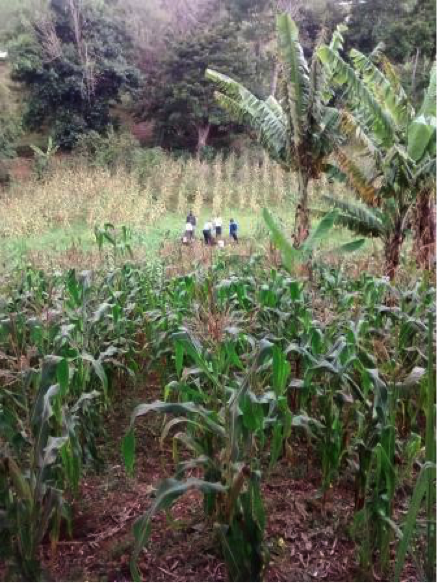by Caroline Mwongera (ELP 2016) | Scientist, International Center for Tropical Agriculture, Kenya
The Brundtland commission defines “sustainable development as development that meets the needs of the present without compromising the ability of future generations to meet their own needs”.
During lectures in the Beahrs Environmental Leadership Program (ELP) at the University of California, Berkeley, thoughts on sustainable development and smallholder agriculture in Africa constantly crossed my mind. My work as a scientist with CIAT focuses on supporting activities in Africa particularly aimed at enhancing climate smart agriculture technologies among smallholder farmers, as well as policies that support climate change adaptation.
I grew up on a small farm located on the Eastern slopes of the second highest mountain in Africa, Mount Kenya. The farms in my community have great crop diversity. You will see plots of mainly maize, beans, banana, coffee, mango, avocado, potatoes, and local vegetables cultivated in the same farm. You can also find other crops such as millet, sorghum, sweet potato, arrow root and cassava as well as rearing of chicken, rabbits, cows and pigs.
The most damaging challenges facing farmers in my Meru community today, are also identified across Africa by the New Partnership for Africa's Development (NEPAD) and include land degradation, a lack of access to and use of new agricultural technologies, limited access to markets, lack of credit, climate risks, low input use and pest and diseases. These challenges represent conflicts in achieving sustainable development.
Smallholder farmers’ decisions are often shaped by economic rather than ecological concepts. Their major pursuit is to eke out a livelihood. This can sometimes come at a cost to environmental sustainability. For example, you will see often that when faced with low agricultural productivity and especially following a bad season, communities are cutting down more trees to burn charcoal for sale to the nearest urban township. You also see that farmers without land tenure are reluctant to engage in tree planting and conservation initiatives on their farms. These and many other decisions that present negative consequences, are made without sufficient reckoning of the true costs of resource depletion. Competition over natural resources for food and non-food uses is hardly new, but has become more intense over the last years resulting in alarming rates of natural resources degradation.If farmers are concerned only with immediate economic returns, is the switch from a myopic view into a more foresighted one that realizes that human progress and environmental integrity depend on each other possible? How can we incorporate a single farm’s interests into a common social interest in sustainable development that regards economic, social and environmental interests?
In her lecture on collaborative leadership, Susan Carpenter argues that one option for planners in motivating communities to work on environmental sustainability involves a three pronged model: 1) identify substantive issues; 2) seek productive relationships; and 3) constructive process.
This approach involves negotiation and consensus building through bringing together conflicting economic, social and environmental interests. This means that all stakeholders need to be invited to the table to speak out about their needs, values and interests related to the issue. For example, environmentalists and loggers could identify certain periods when tree harvesting is allowed. Communities on the other hand could be provided with access to alternative sources of fuel to reduce or eliminate dependence on forests. The idea is that the exchange of knowledge among them, would contribute to the design of more effective development strategies, more appropriate policies, and research that would respond to the demands of the rural sector. It also fosters respect and collaboration among stakeholders.
The process does not result in a win-win, but in mutual gain where the groups represented understand why the final package is fundamentally fair and this improves the chances of effective implementation. Achieving sustainable development in smallholder agriculture systems, though challenging, is achievable by employing various pathways such as collaborative leadership.
Sustainable agriculture development can be realized by allowing dialogue on underlying issues and allowing all stakeholders to participate in generating options that build shared prosperity for today’s population and to continue to meet the needs of future generations.

